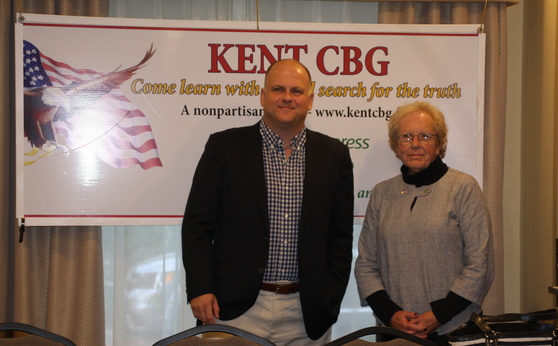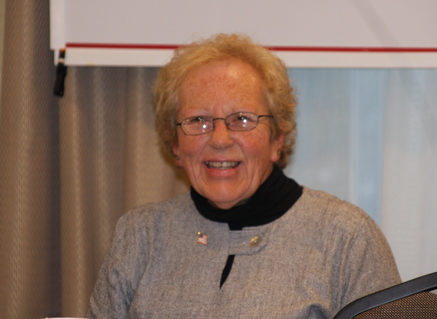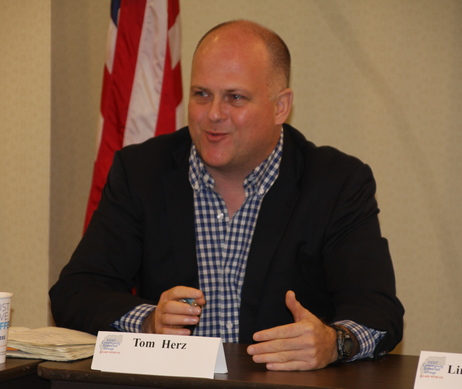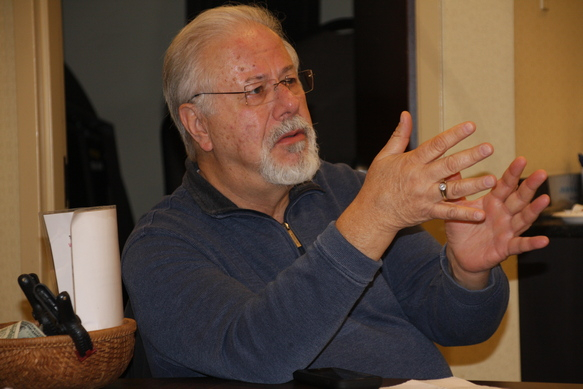
Tom Herz, candidate, and Linda Kuiper, incumbent candidate for the Chestertown Town Council representative for the First Ward — Photo by Jane Jewell
Ward 2 Chestertown Council candidates Linda Kuiper and Tom Herz fielded questions on the Farmers Market, the town’s police department, the town-owned marina, and the local hospital Thursday, Oct. 17, at the Community Breakfast Group meeting.
Incumbent Kuiper and challenger Herz began by giving brief accounts of themselves and their reasons for running. Kuiper said she has been working in the mental health field for more than 30 years, most recently writing policy and procedures for providers. She talked about her record of constituent service – “I answer every question,” she said, adding that she felt that was what an elected official should be doing. She said she regularly goes to the Governor’s office or to the State Highway Administration on behalf of the town.

Linda Kuiper, incumbent candidate for the Chestertown Town Council representative for the First Ward — Photo by Jane Jewell
As examples of her work, she cited the elimination of downtown parking fees after determining that it was a hindrance to business and not a financial benefit to the town. When the then-current parking enforcement officer retired, she pointed out that the officer’s salary was about the same as the parking fees and fines collected so there was really no point to continue. She also worked for the reduction of the speed limit on Quaker Neck road as it enters town. She said she plans to work to eliminate a fee for the town to pick up residential brush. She said one of her constituents had to pay a $80 fee, more than his grocery bill for a week.Tags
Kuiper also mentioned her work with the Farmers Market, saying that she would be introducing a new market manager at the council meeting Oct. 21. She said the market should have its own management and board rather than being overseen by the council. “I feel like I fight city hall” on Farmers Market issues, she said. She said she plans to survey downtown merchants about the effect of closing two streets adjacent to Fountain Park during Farmers Market hours. And she mentioned her volunteer work with the Tea Party Festival, the Historical Society of Kent County, and other organizations. “I’m all over the place,” she said.
Herz, a software developer, said he moved to Chestertown 18 years ago when he was working with Dixon Valve. He said he quickly recognized that Chestertown provides a “work-life balance” that makes it an ideal location for a freelancer in the IT field. In conversations about the future of the town, he said, people tell him it needs another large employer such as Dixon Valve or LaMotte to attract young families. But he said that Kent County’s investment in a fiber-optic network to provide high-speed internet connectivity could attract IT professionals who could work from home a few days a week and still be within commuting distance of three major cities. Making Chestertown “a tech center” would be facilitated by closer cooperation between the town and the county, with Washington College another potentially valuable partner. He said he knows several young people already living that lifestyle.

Tom Herz, candidate for the Chestertown Town Council representative for the First Ward — Photo by Jane Jewell
Herz said he agreed with Kuiper that the Farmers Market needs its own management. He suggested that the market “needs to look outward,” suggesting that it might institute a program of delivering produce to “less mobile” residents who find it difficult to come to the park on Saturdays.
Also, Herz said he is meeting with a professional events planner about ways to get people to hold conferences in nearby venues, attracting people to Chestertown. Local businesses such as hotels and B&BS, restaurants, and car services would be among the beneficiaries – and in the longer run, the visitors might end up buying houses.
Retiring Councilman Marty Stetson began the audience questions by asking Kuiper if she opposes a proposed merger of the town police with the Kent County Sheriff’s office, a move he said would save the town between $600,000 and $800,000 annually out of its $1.6 million public safety budget. Stetson said the sheriff’s department can handle everything the town police are currently doing. “Why are the town police so worried about a merger?” he asked.
Kuiper said the town police do more for residents than just fighting crime. She said they help elderly residents take their medication, check unlocked doors and windows. “They’re there for us,” she said. She said the sheriff’s deputies rarely respond in town, while the town police regularly respond to calls from outside town limits and at Washington College without reimbursement to the town. “I think Washington College should pay for town police work,” she said, noting that problems with off-campus students have greatly diminished in the last couple of years thanks to the town police.
The resignation of former Chief Adrian Baker caused problems it shouldn’t have, Kuiper said. She noted that the new police headquarters building needs a lot of maintenance, dating from before its acquisition by the town. The old headquarters building on Cross Street was sold to Sultana Foundation at a “fire sale” price, she said. She said better management of the police might have saved the town $500,000 last year.
Herz said he was open-minded about the police department and its future. He said his father was an officer in a small town and his sister earned a PhD in criminology. Herz himself was a criminal justice major in college, so he understands some of the issues facing the town, he said. Billables and parking tickets aren’t the answer; he said. The problem is partly due to the benefits packages the officers receive. Because the town’s infrastructure needs work, the council needs to explore ways to save money. Herz said he would be talking to acting Chief John Dolgos and to Sheriff John Price about what kinds of crime the town is dealing with. He noted that the sheriff’s office has modern equipment that the town police lack, including the ability to take electronic finger-prints, the only kind currently accepted by the FBI. On the other hand, public safety has to remain constant. He said that it could be difficult for the town to regain control of the police department if it is ceded to the county, even if it decides after two or three years that the arrangement isn’t working out.
Dr. Harry Hart suggested from the audience that other small towns are facing similar problems and that Chestertown could learn from their experience.
Community Breakfast Group chairman David Atlas asked how the town-owned marina is working out. He had a number of printed questions that were sent in advance by people who were unable to attend the morning but wished to find out the candidates’ views on specific issues.
Kuiper said the design and major renovations are now complete, but the revenue is not there to make the marina self-sustaining. She said the government bonds the town acquired put restrictions on the amount of retail space the marina can have. Also, the 98 Cannon restaurant on the marina property is “a private island” over which the town has little influence. “Nobody wanted a working marina” when the town purchased the property, she said; that decision lost some slip holders, and made it less attractive for boats to come up the river to the marina. She also said the town’s decision to hire its own manager for the marina instead of contracting the position out meant there in an additional salary on the town payroll.
Kuiper said she was on the Waterfront Task Force when the town bought the marina, and that she wouldn’t have favored the purchase if she had been on the council at the time. She said the flat revenue the town has experienced since the beginning of the Great Recession has meant it couldn’t afford such a purchase. She said the marina will be a long-term project.
Herz said he supported the marina without reservations, calling it “one of the best decisions the town has made.” The problems can be fixed, he said. Only 2.3% of the town’s budget goes to debt service for the facility, compared to 47% for public safety. He said the town needs to work harder to build boaters’ awareness of the marina and to position it and the town as attractive destinations. The town needs to make both residents and the rest of the world aware of it, he said. The benefits to the town and to local businesses will follow a successful publicity campaign. The town can get more flexible with rentals and other uses for the marina once the restrictions imposed by the bond issuers expire. “We have to think about the future and ways to attract business,” he said,
Atlas asked whether problems with an oil leak at Shore Medical Center have been resolved.
Kuiper said the town’s attorney warned the council that the agreement between the town and the hospital required the town to prove that any oil detected in its water supply originated on hospital grounds, but the town signed the agreement nonetheless. She said she couldn’t sign the agreement in good faith. The document also allows the hospital to close down the monitoring wells to detect oil beyond its grounds next year. An article by Councilman David Foster, a former Environmental Protection Agency worker, said that no more than 50% of an underground oil spill is normally recoverable. Roughly 170,000 gallons are believed to have been lost from the hospital’s oil tanks, of which about 65,000 gallons had been recovered as of 1996. “We’re in deep trouble if it gets to the water plant” which is just a couple of blocks downhill from the hospital, she said.

David Atlas, an organizer of the Community Breakfast Group, read questions that were submitted in advance by people who were unable to attend. — Photo by Jane Jewell
Atlas asked about ways to make the town attractive to visitors. Herz said bringing in visitors is vital to the town, and called social media the answer to the problem. He said there are built-in ways to determine a social media user’s interests, and the town needs to maximize its utilization of data to get the word out.
Kuiper said the town’s economic development director is exploring ways to attract more visitors to the marina and the town.
Atlas noted that doctors in Easton have gone on record as opposing the transferal of behavioral health patients to the Chestertown hospital, a move that was touted as a way to preserve the hospital’s presence in town.
Herz said that kind of decision is out of the town’s control, but the town can make it hard for Shore Regional Health to make decisions its residents oppose. The town can influence decisions like the one several years ago to pull obstetrics and gynecology out of the local hospital if it can generate a need for it by bringing in young families. In other areas, telemedicine can fill the gaps by providing access to high-quality services. Making sure the local emergency medical technicians are up to the highest standards is another way to make sure that patients receive the best possible care, he said.
Atlas commented that the Shore doesn’t want to have enough people to support a world-class hospital, but it does want access to world-class service. Herz replied by quoting Atlas as having said, “If you want this place to stay the same, something’s got to change.”
The town council election is Nov. 5. Two council seats are up for election, Ward 2 and Ward 4. Meghan Efland is running unopposed for the Ward 4 seat, currently held by Stetson. Only residents of the two wards being contested are eligible to vote.
The Community Breakfast Group meets every Thursday, with breakfast starting at about 7:00 and the day’s program beginning at 7:30 a.m. Every week, the program explores a different issue of interest and importance to the community with expert speakers on the subject. Everyone is welcome. The group is organized and run by David Atlas and John Sirna.
The schedule for upcoming Community Breakfast Group meetings
31 October, Lauren Weber, Wye River Upper School, Reaching and teaching intelligent children with learning difficulties.



Write a Letter to the Editor on this Article
We encourage readers to offer their point of view on this article by submitting the following form. Editing is sometimes necessary and is done at the discretion of the editorial staff.